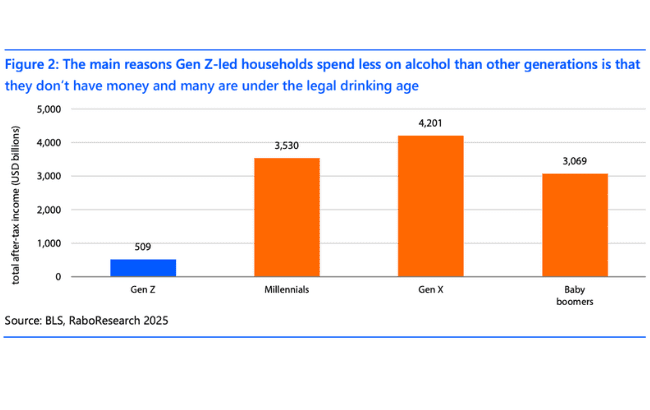Why Gen Z is drinking less alcohol
By Nicola CarruthersA report by Rabobank has shunned the narrative that Generation Z is consuming less alcohol because of health concerns linked to social media, calling it “greatly overblown”.

The Rabobank report, titled ‘The real reasons Generation Z is drinking less’, explored the structural and economic drivers behind the generation’s behaviour in the US.
Rabobank recalled comments made by Brown-Forman CEO Lawson Whiting about Gen Z during a conference call for the group’s nine-month sales on 5 March.
At the time, Whiting said Gen Z are “a little bit different in terms of headwinds” as they are just starting their careers and have less disposable income.
He also claimed the “popular press is overreading into Gen Z and what they are doing”, emphasising that “Gen Z will come back”.
Whiting said: “And in fact, some of our internal studies, this will be something new I don’t think we’ve said… when you get to sort of in that 35-and-up age group, we’re actually seeing per capita going up in the United States.”
The Rabobank report noted that Whiting is partly correct about the generation’s lower spend on alcohol being the result of a constrained income.
The report noted that Lawson’s comments were possibly in response to a “misleading” viral Instagram post that contained the headline ‘Gen Z drinks 87% less alcohol than previous generations’, which was based on figures from the US government’s Bureau of Labor Statistics (BLS).
Rabobank believes the data cited in the Instagram post was “emblematic of a broader failure among journalists and industry analysts to distinguish between shifts in behaviour driven by life stage and shifts in behaviour driven by generation”.

Generational shift
The report pointed to one example, which it calls a ‘generational shift’, where it notes that Gen Z use their phone more often and socialise in person less than previous cohorts.
Rabobank provides several reasons for the BLS statistics. It noted that half of Gen Z are not at the legal drinking age of 21 (in the US), and even less have their own home.
The report continued: “Furthermore, the members of Gen Z that are over 21 years old have yet to get a college degree, are working an entry-level job or not working at all, and therefore don’t have any money to spend on alcohol [see figure two above]. This was also true of Millennials, Generation X, and Baby Boomers when they were in their 20s. If instead you look at the share of after-tax income each generation spends on alcohol, then Gen Z is exactly average.”
Rabobank also noted that one major problem for the alcohol industry is that young people no longer spend as much of their income on drinks.
Between 2012-2013, BLS data showed that households led by an individual under the age of 30 spent 1.1% of their income on alcohol. Based on 2022-2023 BLS data, Rabobank said this is closer to 0.74%.
The report also highlighted that spending on alcohol has largely remained unchanged for households led by people over the age of 30, which suggests Gen Z is spending one-third less on alcohol today than similarly aged Millennials did a decade ago.
Rabobank believes that some elements of social media and mobile phone use will “suppress future consumption” but others (such as parental surveillance) seem to be temporary and will disappear eventually as Gen Z drinkers grow older.
Data cited from the National Survey on Drug Use and Health (covering 2003-2023, but excluding 2020) also detailed that Americans are starting to drink later in life.
It also noted that the most cited reason to explain the generational’s lower alcohol intake was due to deep concerns over health, however Rabobank calls this “greatly over-exaggerated”.
Citing data from the Monitoring the Future survey, Rabobank noted that the risk of binge drinking among high school seniors had remained the same for nearly two decades.
Diversity to boost spirits
As Gen Z is more ethnically diverse compared to previous age groups, this also creates an opportunity for spirits, Rabobank highlights.
The report pointed to comments made by Diageo CEO Debra Crew during the group’s first-half sales call in February: “We are still seeing household penetration for [Gen Z] plus 3%. They are coming into spirits faster than what Millennials did… Even if their numbers are down, so to speak, they are coming into spirits faster. So that ultimately is helping us.”
The report noted that Black, Latino and Asian consumers largely do not have a strong tradition of wine consumption, which could result in headwinds for the category in the future.
In conclusion, Rabobank said that because alcohol is not an early part of a Gen Z’s life that this generation is “far less likely to factor alcohol into their conception of identity, socialisation, and perception of acceptable behaviour”.
As such, it believes that Gen Z will drink less alcohol than previous generations as they age.
Rabobank said the main reason why this generation consumes less alcohol is because it is mostly comprised of women and minority groups.
Therefore, brands must market to women (those with university degrees) and people of colour.
Rabobank concluded: “A logical next step, therefore, is for alcohol brands to ensure their organisations hire enough members of these groups (and put them in positions of power) to thoughtfully, effectively, and authentically drive innovations in product and marketing that reflect the needs of Gen Z consumers as they reach their mid-20s and 30s. That is, when they can afford to buy what they want.”
Related news
Jesús Hernández on a lifetime in Tequila
